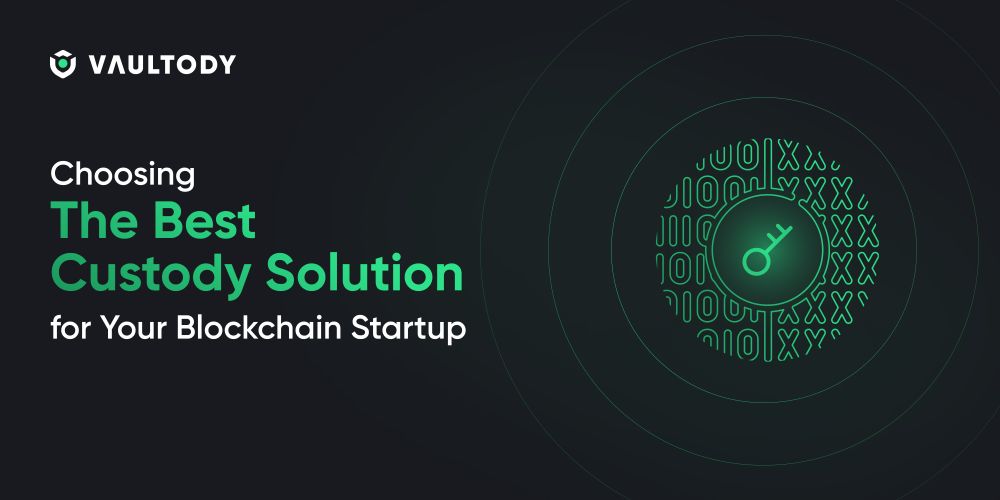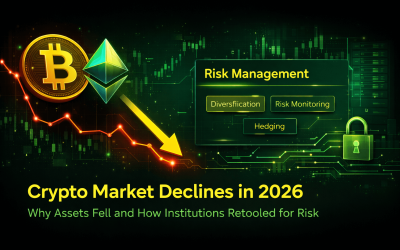The web3 industry is continuously evolving and expanding, and has even surpassed its own growth projections. More and more blockchain companies and start-ups are taking part in the business of developing various digital assets. These include photos and art, such as NFTs, cryptocurrencies, security and utility tokens, stable coins, even digital real estate.
With the demand for and use of large quantities of digital assets, their storage and security has become a concern of the highest importance. So if you run a business with digital assets or are creating a blockchain-based product (dApp, DeFi, etc.) it is vital to choose a trust-worthy and competent custody management provider.
Why you need a custody solution
Dealing with digital assets is not as different from dealing with government-issued fiat currencies, in regards to them both needing secure storage. Companies use the services of secure and well-established banks to safely store their capital. Following the same logic, any business dealing with the development and trading of digital assets ought to use a credible and reliable custody solution. But there is a lot more to it.
When discussing securing digital assets, things become a bit more complex, considering their nature and technology. Digital assets are actually unique, decentralized and cannot be replaced or easily replicated, so if their security is compromised, it is almost unlikely they can be retrieved.
A major benefit from using the services of digital asset custody solutions would be the fact that they are market regulated and certified. Regulatory compliance is an important part of security and ensures brand trust and increases reliance on the management of digital assets, regardless of whether services are provided B2B or B2C. Various certificates and registrations are required to be able to act as a custodian. These depend on the country and continent, as they form different markets.
Moreover, choosing a digital asset custodial needs to be a highly specific and vetted process, as the assets must be securely stored as well as at the same time be available for use. This puts a different spin on the whole “storing assets” factor and raises questions such as who would have access and how it would be provided.
This is why the topic of choosing a good custodial is so popular and of high importance.
What “custody” means
In order to explain what “custody” actually means in the blockchain world, we need to first explain how access to a digital asset happens.
Accessing digital assets happens through private and public keys. These are digital cryptographic mechanisms that allow the management and usage of a digital asset, in terms of secure data exchange and digital signatures. As mentioned, two types of keys are present:
1. Private key - much like a password, known only to the asset’s owner, the private key can encrypt and decrypt data connected to that asset, and must be kept safe; the private key can be used to impersonate the owner and gain access to the assets;
2. Public key - much like an address, shared openly, a cryptographically derived number connected directly to the private key, on its own it has little value, but when paired with the private key, transactions can be executed;
In less words - whoever controls the private key, controls the digital asset, i.e. “has custody”. Custody solutions offer security in terms of keeping that private key safe.
Types of Custody solutions
There are two main digital asset custody solution types for institutions:
1. Self-Custody - This entails that the owner holds on to its own private keys and does not provide access to third-party custodians. It has advantages such as increased privacy and better access to the assets, but does pose greater risk in terms of security and regulations.
2. Custody providers - Custody providers are external service providers that will securely store and manage your digital assets’ private keys on your behalf. Choosing a third-party custodian would mean potentially giving up some privacy but it also means that the security measures and compliance levels would be much more adequate than self-custody. There are multiple subtypes of custody providers, some of which are:
a) Cold storage custody - digital assets are kept offline, ensuring higher security against cyber threats;
b) Hot storage custody - digital assets are stored online, providing immediate accessibility;
c) Institutional-grade custody - tailored custody solutions for institutional investors, such as asset managers, hedge funds, and banks;
d) Exchanges - platforms that hold customers’ digital assets in exchange for trading (exchanging) services, ergo allowing the users to buy, sell, and trade cryptocurrencies and other digital assets while also managing their storage on behalf of the users.
Factors to consider when choosing a custody management solution
As so far explained, choosing a suitable custody provider for your business needs is an important process and many factors come into play. Here is what to consider.
1. Security factors - Security is key when trusting a custody management solution with your digital assets. Choosing one that offers a wide range of security factors can be the difference between your company’s success and failure. Some of the most used security methods include applying the MPC (Multi-Party Computation) method for best key management through key shares and complex computations, multifactor authentication and regular audits, availability to set and manage asset-related activities, action roles and permissions, and much more.
2. Regulatory Compliance - Regulatory compliance is essential. A good choice for a digital custodial would be one who adheres to regulations and complies with the policies at place. An example is using AML (Anti-Money Laundering) and KYT (Know Your Transaction) integrations. Custodians can also possess various licences proving they are regulatory compliant. They vary among countries, unions and different markets. For instance:
a) For the US such licences include the State Trust Charter, which allows companies to act as custodians for digital assets;
b) For the UK there is the Financial Conduct Authority (FCA) Registration, which requires registration by companies dealing with digital assets in order to comply with AML requirements;
c) For Singapore there is the Singapore Major Payment Institution License, which allows custody management firms to store and manage digital assets;
d) For Japan there is the Japanese Financial Services Agency (FSA) Custody License, which is necessary for any digital asset custodial operating in the country;
e) For Australia there is the Australian Digital Currency Exchange (DCE) Registration, which is required for Australian-based custodials in order to meet AML/CTF obligations;
f) For the EU there is the Electronic Money Institution (EMI) License, which allows businesses to hold, transfer, and exchange digital assets within the EU, and the MiCA License, which will be required in order for custodial businesses to offer their services within the EU.
3. Reputation and reliance - Choosing a custodial with a good reputation and approved products and features can be achieved through thorough research and contacting multiple prospective companies. Reliability and trust are must qualifications for the company that will be handling and storing your digital assets.
4. Scalability - An important factor for choosing an adequate custody provider. As your business grows, digital assets increase and it is important that the solution you’ve chosen can grow along with you. Being able to successfully scale will enable your digital asset management to scale without the need to completely revamp your business structure. This will lead to continuous and better transaction processing and reduced operational costs over time.
5. User Experience - A quality UX will provide ease and comfort to customers of digital asset management solutions that implement it. When the system is easy to understand and has a user-friendly interface, that can facilitate easier navigation and asset management, enhancing overall efficiency.
6. Cost Structure - The market consists of multiple options for digital asset management solutions with varying price lists. It is important what they offer for their prices and to check if their pricing includes setup fees, ongoing management fees, and any transaction costs. Such solutions may also offer Understanding the pricing model is crucial for effective budgeting and cost-effectiveness.
7. Support - When evaluating custodians for your digital assets it is also an important factor whether they provide support and what that support would entail. In most cases digital asset management companies would offer a three- or four-tier plan, with support scope increasing each plan tier.
Why Vaultody
Vaultody combines the security of the vault with the flexibility of the custody technology.
It is not a custody provider in the traditional sense. Instead, Vaultoday is a next-level enterprise-focused technology provider that enables institutions and companies to securely store and manage their digital assets through different custody management methods while maintaining full access to them. The customization levels and variety of products and features provided fit together to create an exclusive and unique all-in-one custodial platform. Unlike other similar products, custodials and custody providers, Vaultody is also equipped with add-ons as we have no features restrictions.
In simpler terms? Vaultody is a better alternative to the conventional custodial, is more advanced and provides greater flexibility and features.
1. Third-party technology provider - Vaultody provides digital asset management solutions as a third-party next-level technology provider based on an upgraded Wallet-as-a-Service technology.
2. MPC and TSS - Vaultody utilizes the Multi-Party Computation method which divides a single private key into shares among stakeholders, and works with the Threshold Signature Scheme (TSS) providing security against external hacks and insider threats.
3. General, Automation and Smart Vaults - Vaultody offers three Vault types:
a) General - a standard omnibus wallet for standard usage;
b) Automation - enables automated transactions through beforehand set conditions and triggers;
c) Smart - designed by the Vaultody team innovative vault type which utilizes the power of smart contracts on EVM-based protocols, through which it eliminates vault dust issues, reduces transaction fees and allows easier digital funds management.
Vaultody is also equipped with numerous security measures integrated with the purpose to provide the most sophisticated security to the digital possessions of our clients, being at the same time EU market regulated.
Some security and additional features of Vaultody include:
- Advanced API keys;
- Webhooks,
- AML/KYT;
- Operational Log;
- Different pricing tiers plus custom plans;
- Team roles and System actions;
- Transaction history;
- Backup and recovery, etc.
To see more of Vaultody’s features and products, check out our web page.









 Copy link
Copy link